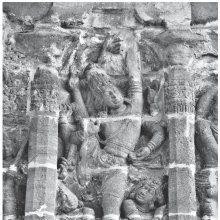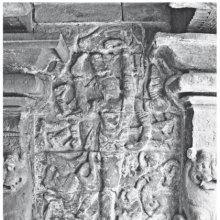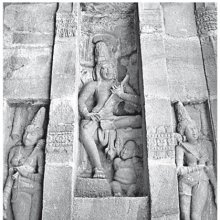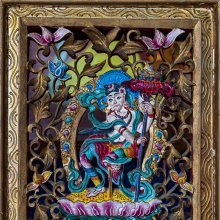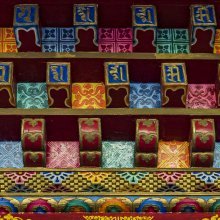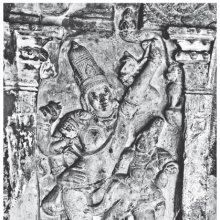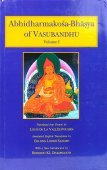La, Lā, Ḻā, Ḷā: 18 definitions
Introduction:
La means something in Buddhism, Pali, Hinduism, Sanskrit, Marathi, Hindi, biology, Tamil. If you want to know the exact meaning, history, etymology or English translation of this term then check out the descriptions on this page. Add your comment or reference to a book if you want to contribute to this summary article.
The Sanskrit term Ḷā can be transliterated into English as La or Lia, using the IAST transliteration scheme (?).
Images (photo gallery)
(+79 more images available)
In Hinduism
Vyakarana (Sanskrit grammar)
Source: Wikisource: A dictionary of Sanskrit grammar1) La (ल).—Consonant ल् (l); see ल् (l) above'
2) La.—A general term usually used by ancient grammarians to signify-लोप (lopa) (elision or disappearance) of a letter or a syllable or a word; cf. सर्वसादेर्द्विगोश्च लः (sarvasāderdvigośca laḥ) | सवार्तिकः, द्वितन्त्रः (savārtikaḥ, dvitantraḥ) M. Bh. on P.IV.2.60;
3) La.—tad. affix ल (la) added to the word क्लिन्न (klinna) when चिल् (cil) and पिल् (pil) are substituted for the word क्लिन्न (klinna); e.g, चिल्लः, पिल्लः (cillaḥ, pillaḥ) cf. P.V. 2.33 Vārt 2.

Vyakarana (व्याकरण, vyākaraṇa) refers to Sanskrit grammar and represents one of the six additional sciences (vedanga) to be studied along with the Vedas. Vyakarana concerns itself with the rules of Sanskrit grammar and linguistic analysis in order to establish the correct context of words and sentences.
Chandas (prosody, study of Sanskrit metres)
Source: Shodhganga: a concise history of Sanskrit Chanda literatureLa (ल) is a Sanskrit abbreviation for the laghu letter.—The whole chanda literature has several technical terms, by which it is controlled. Single letters are used to denote a specific instance. The letter ga stands for guru letter while the letter la stands for laghu letter. In a verse the letter which is guru is also known as dīrgha (long) and which is laghu is also known as hrasva (short). The dīrgha letter consists of two mātrās while the hrasva letter consists of one mātrā.
Laghu can be identified as menu, kāhāla (daṇḍa) or śara, and the guru symbols can be identified as the shape of tāṭaṅka, hāra or keyūra.

Chandas (छन्दस्) refers to Sanskrit prosody and represents one of the six Vedangas (auxiliary disciplines belonging to the study of the Vedas). The science of prosody (chandas-shastra) focusses on the study of the poetic meters such as the commonly known twenty-six metres mentioned by Pingalas.
Purana and Itihasa (epic history)
Source: archive.org: Puranic EncyclopediaLa (ल).—This letter means the Creator. (Chapter 348, Agni Purāṇa).

The Purana (पुराण, purāṇas) refers to Sanskrit literature preserving ancient India’s vast cultural history, including historical legends, religious ceremonies, various arts and sciences. The eighteen mahapuranas total over 400,000 shlokas (metrical couplets) and date to at least several centuries BCE.
In Buddhism
Tibetan Buddhism (Vajrayana or tantric Buddhism)
Source: OSU Press: Cakrasamvara SamadhiLā (ला) refers to “meat”, according to Buddhist teachings followed by the Newah in Nepal, Kathmandu Valley (whose roots can be traced to the Licchavi period, 300-879 CE).—The goal of the [Vāruṇīpūjā] ritual is to mix the two substances together by taking an egg (khyaṃ), fish (nyā), and meat (lā) (all Newah), and to dip it in the khāy, and then to “seed” the alcohol by placing it in the thāpiṃ. When together the two as one are referred to as Ānandā-Vāruṇī, where as a single mixture of male and female sexual fluids combined, the male deity Ānanda takes on the feminine form Ānandā, because it has been deposited into the thāpiṃ, which in this context symbolizes the vagina and uterus as a receptacle. Shorter versions of the vāruṇīpūjā appear at the end of the Guru Maṇḍala as the Bali Bhāvanā, “Bali Meditation”, and in the Cakrasaṃvara Samādhi as the Mantra Pātra.

Tibetan Buddhism includes schools such as Nyingma, Kadampa, Kagyu and Gelug. Their primary canon of literature is divided in two broad categories: The Kangyur, which consists of Buddha’s words, and the Tengyur, which includes commentaries from various sources. Esotericism and tantra techniques (vajrayāna) are collected indepently.
Biology (plants and animals)
Source: Wisdom Library: Local Names of Plants and DrugsLa in the Mizo language is the name of a plant identified with Gossypium arboreum L. from the Malvaceae (Mallow) family. For the possible medicinal usage of la, you can check this page for potential sources and references, although be aware that any some or none of the side-effects may not be mentioned here, wether they be harmful or beneficial to health.

This sections includes definitions from the five kingdoms of living things: Animals, Plants, Fungi, Protists and Monera. It will include both the official binomial nomenclature (scientific names usually in Latin) as well as regional spellings and variants.
Languages of India and abroad
Marathi-English dictionary
Source: DDSA: The Molesworth Marathi and English Dictionaryla (ल).—The twenty-eighth consonant. It corresponds with L.
--- OR ---
ḷa (ळ).—The thirty-fourth consonant. It differs greatly from the English L. The exact sound of it can be acquired only by the ear. It never occurs initially.
Source: DDSA: The Aryabhusan school dictionary, Marathi-Englishḷa (ळ).—or -
--- OR ---
la (ल).—or-
--- OR ---
ḷa (ळ).—or-
--- OR ---
la (ल).—The twenty-eighth consonant.
Marathi is an Indo-European language having over 70 million native speakers people in (predominantly) Maharashtra India. Marathi, like many other Indo-Aryan languages, evolved from early forms of Prakrit, which itself is a subset of Sanskrit, one of the most ancient languages of the world.
Sanskrit dictionary
Source: DDSA: The practical Sanskrit-English dictionaryLa (ल).—
1) An epithet of Indra.
2) A short syllable (in prosody).
3) A technical term used by Pāṇini for the ten tenses and moods (there being ten lakāras).
4) (In astr.) The number '5'; Gīrvāṇa.
Derivable forms: laḥ (लः).
--- OR ---
Lā (ला).—2 P. (lati) To take, receive, obtain, take up; ललुः खड्गान् (laluḥ khaḍgān) Bhaṭṭikāvya 14.92;15.53.
--- OR ---
Lā (ला).—f.
1) Taking, receiving.
2) Giving.
Source: Cologne Digital Sanskrit Dictionaries: Shabda-Sagara Sanskrit-English DictionaryLa (ल).—The twenty-eighth consonant of the Nagari alphabet, the letter L.
--- OR ---
La (ल).—m.
(-laḥ) 1. Indra. 2. Cutting. 3. A short syllable, (in prosody.) 4. Panini'S technical term for all the tenses and modes, (in gram.) f.
(-lā) 1. Giving. 2. Receiving, taking. f. (-lī) 1. Embracing, adhering or clinging to. 2. Liquifying, melting. E. lā to give or take, &c., aff. ka or ḍa, fem. aff. ṭāp or ṅīṣ .
--- OR ---
Lā (ला).—r. 2nd cl. (lāti) 1. To give. 2. To get, to receive.
Source: Cologne Digital Sanskrit Dictionaries: Benfey Sanskrit-English DictionaryLā (ला).—ii. 2, [Parasmaipada.] To take, [Bhaṭṭikāvya, (ed. Calc.)] 15, 53.
Source: Cologne Digital Sanskrit Dictionaries: Cappeller Sanskrit-English DictionaryLa (ल).—[masculine] the common name for all tenses & moods or verbal terminations.
--- OR ---
Lā (ला).—lāti grasp, seize, take; [gerund] lātvā having taken, i.e. with.
Source: Cologne Digital Sanskrit Dictionaries: Monier-Williams Sanskrit-English Dictionary1) La (ल):—1. la the 3rd semivowel (corresponding to the vowels ḷ, ḹ, and having the sound of the English l)
2) a technical term for all the tenses and moods of a finite verb or for the terminations of those tenses and moods (also applied to some forms with kṛt affixes construed like a finite verb, [Pāṇini 2-3, 69]; cf. [iii, 2, 124], and when accompanied by certain indicatory letters denoting each tense separately See laṭ; laṅ; liṅ; loṭ; liṭ; luṭ; ḷṭ; luṅ; ḷṅ; leṭ), [Pāṇini 3-4, 69; 77 [Scholiast or Commentator]]
3) 2. la m. Name of Indra, [cf. Lexicographers, esp. such as amarasiṃha, halāyudha, hemacandra, etc.]
4) cutting (? cf. lava), [Horace H. Wilson]
5) Lā (ला):—[from la] a f. See sub voce
6) La (ल):—3. la (in prosody) = laghu, a short syllable.
7) Lā (ला):—1. lā [class] 2. [Parasmaipada] ([Dhātupāṭha xxiv, 50]) lāti ([perfect tense] lalau, [Bhaṭṭi-kāvya]; [Aorist] alāsīt, [ib.]; [future] lātā, lāsyati [grammar]; [indeclinable participle] lātvā, [Śatruṃjaya-māhātmya]),
—to take, receive, obtain, [Kāvya literature; Sāhitya-darpaṇa; Hemacandra’s Pariśiṣṭaparvan];
—to undertake, begin, [Campaka-śreṣṭhi-kathānaka];
—to give, [Dhātupāṭha]
8) cf. [Hindi] lenā.
9) 2. lā f. the act of taking or giving, [cf. Lexicographers, esp. such as amarasiṃha, halāyudha, hemacandra, etc.]
Source: Cologne Digital Sanskrit Dictionaries: Yates Sanskrit-English Dictionary1) La (ल):—l The twenty-eighth consonant and third of the liquids.
2) (laḥ) 1. m. Indra; cutting. f. (lā) Giving; taking. f. (lī) Embracing, liquifying, melting.
3) Lā (ला):—(la) lāti 2. a. To give; to get.
[Sanskrit to German]
Sanskrit, also spelled संस्कृतम् (saṃskṛtam), is an ancient language of India commonly seen as the grandmother of the Indo-European language family (even English!). Closely allied with Prakrit and Pali, Sanskrit is more exhaustive in both grammar and terms and has the most extensive collection of literature in the world, greatly surpassing its sister-languages Greek and Latin.
Hindi dictionary
Source: DDSA: A practical Hindi-English dictionary1) La (ल) [Also spelled l]:——traditionally, the third of the semi-vowel series [ya, ra, la, va] of the Devnagri: alphabet. Modern phoneticians do not, however, recognise the letter as a semi-vowel in Hindi but as a consonant.
2) Lā (ला):——an Arabic prefix used to express negation, or the sense of being without and beyond etc. (as [lāilāja, lāvārisa]); (v) imperative second person singular form of the verb [lānā].
...
Kannada-English dictionary
Source: Alar: Kannada-English corpusLa (ಲ):—
1) [noun] (gen. pronounced with the vowel 'ಅ') the forty second letter of Kannaḍa alphabet and the twenty eighth consonant.
2) [noun] (math.) a symbol for the number three.
3) [noun] (pros.) the abbreviated form of laghu, a short syllable; a short prosodic unit (u).
--- OR ---
Ḷa (ಳ):—
1) [noun] (gen. pronounced with the vowel 'ಅ') the forty eighth letter of Kannaḍa alphabet and the thirty fourth consonant.
2) [noun] (math.) a symbol for the number nine.
--- OR ---
Ḻa (ೞ):—[noun] (gen. pronounced with the vowel 'ಅ') the fiftieth letter of Kannaḍa alphabet and the thirty sixth consonant.
Kannada is a Dravidian language (as opposed to the Indo-European language family) mainly spoken in the southwestern region of India.
Tamil dictionary
Source: DDSA: University of Madras: Tamil LexiconLa (ல) . The compound of ல் [l] and அ. [a.]
--- OR ---
Lā (லா) . The compound of ல் [l] and ஆ. [a.]
--- OR ---
Ḻa (ழ) . The compound of ழ் [zh] and அ. [a.]
--- OR ---
Ḻā (ழா) . The compound of ழ் [zh] and ஆ. [a.]
--- OR ---
Ḷa (ள) . The compound of ள் [l] and அ. [a.]
--- OR ---
Ḷā (ளா) . The compound of ள் [l] and ஆ. [a.]
Tamil is an ancient language of India from the Dravidian family spoken by roughly 250 million people mainly in southern India and Sri Lanka.
See also (Relevant definitions)
Starts with (+6495): La bo he, La chang shu, La cho, La envidia, La exotica, La gen, La giap, La hen, La khowang, La la bud, La la phud, La lae, La lang, La liao, La liao tie xian lian, La mei, La mon, La monk, La mu, La mu shu.
Ends with (+9980): A ti ba la, A-kara-vishti-konjalla, A-shukla, Aabala, Aadalodakathila, Aaduthoda pala, Aaku paala, Aala, Aala aala, Aalapala, Aamkola, Aanebyala, Aankhla, Aankula, Aaowla, Aattola, Aattukanala, Aattukottappala, Aawla, Ababila.
Full-text (+10592): Nadvala, Atibala, Apashthula, Gadula, Jihvala, Anargala, Vishala, Kamala, Bahula, Mukhashthila, Citratandula, Amula, Lilakhela, Amshula, Lajjashila, Udarila, Tanula, Pittala, Argala, Svapnashila.
Relevant text
One of your search terms exceeds the minimun character amount per search term. This amount currently equals 2.
No search results for La, Ḷa, Lā, Ḻa, Ḻā, Ḷā, Laa, Zha, Zhaa; (plurals include: Laas, Zhas, Zhaas) in any book or story.
Related products
